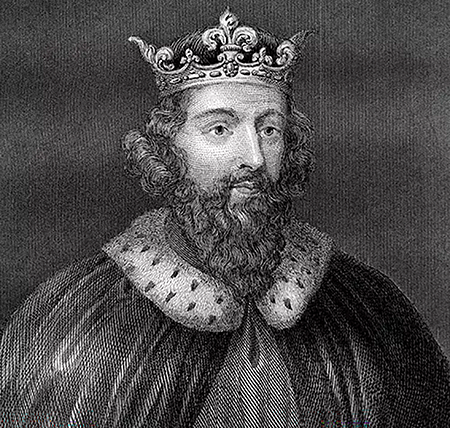



King Alfred the Great – Quick Stats





Following this victory, Alfred negotiated the Treaty of Wedmore, which established Guthrum as ruler of East Anglia and ensured the Vikings converted to Christianity. The treaty also delineated the Danelaw, a region of Viking control in the north and east of England.
Born: 848/849 AD, in Wantage, Berkshire
Died: October 26, 899 AD, in Winchester, Wessex
Mother: Osburh
Father: King Æthelwulf of Wessex
Wife: Ealhswith of Mercia
Children: Edward the Elder (successor as King of Wessex)
Æthelflæd (Lady of the Mercians)
Ælfthryth (married Baldwin II, Count of Flanders)
Æthelweard (a scholar)
Æthelgifu (abbess)
Predecessor: King Æthelred I (his brother)
Successor: Edward the Elder (his son)
Died: October 26, 899 AD, in Winchester, Wessex
Mother: Osburh
Father: King Æthelwulf of Wessex
Wife: Ealhswith of Mercia
Children: Edward the Elder (successor as King of Wessex)
Æthelflæd (Lady of the Mercians)
Ælfthryth (married Baldwin II, Count of Flanders)
Æthelweard (a scholar)
Æthelgifu (abbess)
Predecessor: King Æthelred I (his brother)
Successor: Edward the Elder (his son)
Legacy:
Alfred is the only English monarch to bear the epithet “the Great” due to his achievements in defending his kingdom, promoting learning, and laying the foundations for a unified England. His reforms in law, governance, and culture had a profound and lasting impact on the development of England.
Conclusion
King Alfred the Great stands as a towering figure in English history, embodying resilience and vision during a time of great upheaval. His ability to adapt to challenges, from Viking invasions to societal decline, ensured the survival of Wessex and laid the groundwork for the eventual unification of England. A warrior, scholar, and reformer, Alfred’s legacy continues to inspire admiration and respect over a millennium after his death.
Alfred is the only English monarch to bear the epithet “the Great” due to his achievements in defending his kingdom, promoting learning, and laying the foundations for a unified England. His reforms in law, governance, and culture had a profound and lasting impact on the development of England.
Conclusion
King Alfred the Great stands as a towering figure in English history, embodying resilience and vision during a time of great upheaval. His ability to adapt to challenges, from Viking invasions to societal decline, ensured the survival of Wessex and laid the groundwork for the eventual unification of England. A warrior, scholar, and reformer, Alfred’s legacy continues to inspire admiration and respect over a millennium after his death.
King Alfred the Great: A Monarch Who Shaped England’s Destiny
King Alfred the Great (848/9-899 AD) is one of the most celebrated figures in English history. Renowned for his military prowess, intellectual contributions, and administrative reforms, Alfred’s reign (871-899) marked a turning point in the survival and consolidation of Anglo-Saxon England during the Viking Age. This article explores his life, achievements, and enduring legacy in detail.
Early Life and Family Background:
Birth: Alfred was born in 848 or 849 AD in Wantage, Berkshire, to King Æthelwulf of Wessex and his wife Osburh.
Siblings: Alfred was the youngest of six children, with notable brothers such as Æthelred I, who preceded him as king.
Education and Travel: Despite being the youngest, Alfred displayed an early aptitude for learning and leadership. As a child, he accompanied his father on a pilgrimage to Rome, where he received recognition from Pope Leo IV, who anointed him as a future leader.
Alfred’s early exposure to the Church and education influenced his later focus on literacy and learning.
Birth: Alfred was born in 848 or 849 AD in Wantage, Berkshire, to King Æthelwulf of Wessex and his wife Osburh.
Siblings: Alfred was the youngest of six children, with notable brothers such as Æthelred I, who preceded him as king.
Education and Travel: Despite being the youngest, Alfred displayed an early aptitude for learning and leadership. As a child, he accompanied his father on a pilgrimage to Rome, where he received recognition from Pope Leo IV, who anointed him as a future leader.
Alfred’s early exposure to the Church and education influenced his later focus on literacy and learning.
Accession to the Throne:
Ascension: Alfred became king in 871 after the death of his brother Æthelred I. At the time, Wessex was under severe threat from the Great Heathen Army, a coalition of Norse warriors who had already overrun much of England.
Challenges: Alfred inherited a kingdom on the brink of collapse, with repeated Viking raids and a demoralized populace.
Military Campaigns Against the Vikings
Alfred’s reign is best remembered for his defense of Wessex against the Vikings, particularly his strategic and innovative approach to warfare.
Ascension: Alfred became king in 871 after the death of his brother Æthelred I. At the time, Wessex was under severe threat from the Great Heathen Army, a coalition of Norse warriors who had already overrun much of England.
Challenges: Alfred inherited a kingdom on the brink of collapse, with repeated Viking raids and a demoralized populace.
Military Campaigns Against the Vikings
Alfred’s reign is best remembered for his defense of Wessex against the Vikings, particularly his strategic and innovative approach to warfare.
The Battle of Ashdown (871)
Before becoming king, Alfred played a critical role in this battle alongside Æthelred. The Anglo-Saxon forces achieved a rare victory, killing several Viking leaders.
Before becoming king, Alfred played a critical role in this battle alongside Æthelred. The Anglo-Saxon forces achieved a rare victory, killing several Viking leaders.
The Treaty of Wedmore (878)
One of Alfred’s greatest triumphs came after a desperate struggle in 878. The Vikings, led by Guthrum, launched a surprise attack, forcing Alfred into hiding in the marshes of Athelney. From there, Alfred rallied his forces and defeated the Vikings at the Battle of Edington.
One of Alfred’s greatest triumphs came after a desperate struggle in 878. The Vikings, led by Guthrum, launched a surprise attack, forcing Alfred into hiding in the marshes of Athelney. From there, Alfred rallied his forces and defeated the Vikings at the Battle of Edington.
Naval Reforms:
Alfred is often considered the "father of the English navy." He recognized the importance of controlling the seas and developed a fleet of longships designed to counter Viking naval supremacy.
Alfred is often considered the "father of the English navy." He recognized the importance of controlling the seas and developed a fleet of longships designed to counter Viking naval supremacy.
Administrative Reforms:
Beyond his military achievements, Alfred undertook significant reforms to strengthen his kingdom.
Beyond his military achievements, Alfred undertook significant reforms to strengthen his kingdom.
Legal Code
Alfred compiled a comprehensive legal code, drawing from biblical principles, earlier Anglo-Saxon laws, and his own sense of justice. Known as the Doom Book or Alfred’s Laws, it emphasized fairness and the protection of the weak.
Alfred compiled a comprehensive legal code, drawing from biblical principles, earlier Anglo-Saxon laws, and his own sense of justice. Known as the Doom Book or Alfred’s Laws, it emphasized fairness and the protection of the weak.
Fortification System (Burhs)
To defend Wessex, Alfred established a network of fortified towns known as burhs. These strategically located fortifications provided safe havens for local populations and served as bases for launching counterattacks against Viking forces.
To defend Wessex, Alfred established a network of fortified towns known as burhs. These strategically located fortifications provided safe havens for local populations and served as bases for launching counterattacks against Viking forces.
Administrative Divisions
Alfred restructured the kingdom into shires, hundreds, and tithings, laying the groundwork for the modern English county system. This reorganization improved governance and military mobilization.
Alfred restructured the kingdom into shires, hundreds, and tithings, laying the groundwork for the modern English county system. This reorganization improved governance and military mobilization.
Cultural and Educational Contributions:
Alfred’s contributions to learning and culture were transformative, earning him the title "the Great."
Alfred’s contributions to learning and culture were transformative, earning him the title "the Great."
Promotion of Literacy
Alfred lamented the decline of learning among the clergy and laity due to Viking disruptions. To address this, he invited scholars from across Europe to his court and encouraged the translation of key texts into Old English.
Alfred lamented the decline of learning among the clergy and laity due to Viking disruptions. To address this, he invited scholars from across Europe to his court and encouraged the translation of key texts into Old English.
Translation Projects
Alfred personally oversaw and possibly contributed to translations of important works, including:
Pope Gregory’s Pastoral Care
Boethius’s Consolation of Philosophy
Bede’s Ecclesiastical History of the English People
These translations made knowledge accessible to a broader audience and preserved key cultural and religious ideas.
Alfred personally oversaw and possibly contributed to translations of important works, including:
Pope Gregory’s Pastoral Care
Boethius’s Consolation of Philosophy
Bede’s Ecclesiastical History of the English People
These translations made knowledge accessible to a broader audience and preserved key cultural and religious ideas.
The Anglo-Saxon Chronicle
Alfred is credited with initiating the compilation of the Anglo-Saxon Chronicle, a year-by-year record of England’s history. This invaluable resource provides insights into the political, military, and cultural developments of the era.
Alfred is credited with initiating the compilation of the Anglo-Saxon Chronicle, a year-by-year record of England’s history. This invaluable resource provides insights into the political, military, and cultural developments of the era.
Personal Characteristics:
Alfred was known for his piety, intelligence, and sense of duty. Despite chronic health issues, possibly related to Crohn’s disease or another gastrointestinal ailment, he remained a tireless leader.
Alfred was known for his piety, intelligence, and sense of duty. Despite chronic health issues, possibly related to Crohn’s disease or another gastrointestinal ailment, he remained a tireless leader.
Death and Legacy:
Death: Alfred died in 899 AD, likely in Winchester.
Burial: He was initially buried at Winchester’s Old Minster and later reinterred at Hyde Abbey, though his remains were lost during the Dissolution of the Monasteries.
Death: Alfred died in 899 AD, likely in Winchester.
Burial: He was initially buried at Winchester’s Old Minster and later reinterred at Hyde Abbey, though his remains were lost during the Dissolution of the Monasteries.


